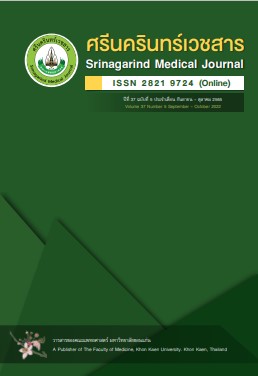ปัจจัยเศรษฐานะทางเศรษฐกิจและสังคมกับการไม่มาตรวจคัดกรองมะเร็งลำไส้ใหญ่และไส้ตรงในโครงการตรวจคัดกรองมะเร็งระยะแรก จังหวัดอุบลราชธานี
Association between Socio-economic Status Factors and Non-participation among Colo-Rectal Cancer Screening in Ubon Ratchathani Province
Abstract
หลักการและวัตถุประสงค์: มะเร็งลำไส้ใหญ่และไส้ตรง (Colorectal Cancer: CRC) เป็นสาเหตุสำคัญในการเสียชีวิต แต่ยังพบว่าการเข้าถึงบริการตรวจคัดกรองแต่ละพื้นที่ยังมีความแตกต่างกันและมีการศึกษาน้อย ดังนั้นการศึกษานี้จึงมีวัตถุประสงค์เพื่อศึกษาความสัมพันธ์ระหว่างปัจจัยเศรษฐานะทางเศรษฐกิจและสังคม (socio-economic status: SES) กับการไม่มาตรวจคัดกรอง CRC
วิธีการศึกษา: แบบ Analytics Case-control study จากโครงการตรวจคัดกรอง CRC ในระยะแรกและฐานข้อมูล Health Data Center (HDC) ของสำนักงานสาธารณสุขจังหวัดอุบลราชธานี ระหว่าง 1 ตุลาคม พ.ศ. 2561 ถึง 30 กันยายน พ.ศ. 2563 ประชากรที่เป็นกลุ่มเป้าหมายในการตรวจคัดกรอง อายุระหว่าง 50 – 70 ปี จำนวน 250 ราย แบ่งเป็น 2 กลุ่มคือ กลุ่ม Case คือคนที่ไม่มาตรวจคัดกรอง CRC 125 ราย และกลุ่ม Control คือคนที่มาตรวจคัดกรอง CRC 125 ราย เก็บข้อมูลโดยแบบสัมภาษณ์ วิเคราะห์ความสัมพันธ์ โดย Multiple logistic regression นำเสนอค่า Adjusted Odds Ratio (Adjusted OR) พร้อมช่วงเชื่อมั่น 95% และค่า p-value
ผลการศึกษา: ปัจจัยที่มีความสัมพันธ์กับการไม่มาตรวจคัดกรอง CRC อย่างมีนัยสำคัญทางสถิติ (p<0.05) ได้แก่ ระดับการศึกษา อาชีพ รายได้ครัวเรือน อาการท้องผูกสลับกับท้องเสีย การสนับสนุนจากครอบครัว ในขณะที่อายุไม่มีความสัมพันธ์กับการไม่มาตรวจคัดกรอง CRC
สรุป: ปัจจัยด้านเศรษฐานะ (การศึกษา อาชีพ รายได้ครัวเรือนต่อเดือน) อาการท้องผูกสลับกับท้องเสียและการได้รับการสนับสนุนจากครอบครัวในการเข้ารับบริการตรวจคัดกรองโรค เป็นปัจจัยที่สำคัญกับการไม่มาตรวจคัดกรองมะเร็วลำไส้ใหญ่และไส้ตรง
คำสำคัญ: สถานะทางเศรษฐกิจและทางสังคม, มะเร็งลำไส้ใหญ่และไส้ตรง, โครงการตรวจคัดกรองมะเร็งระยะแรก
Background and Objective: Colorectal cancer (CRC) is an important cause of death. But it also found that access to screening services in each area was different and less investigted. Therefore, this study aimed to study the association between socio-economic status factors and non-participation in CRC sereening project.
Methods: An analytics case-control study. Data were retrieved from the CRC screening project and Health Data Center, HDC database of Ubon Ratchathani Provincial Public Health Office between 1st October 2018 and 30th September 2020, that is the target group in the screening aged between 50-70 years of 250 cases, and divided into two groups; Case and Control cases were 125 volunteers who didn't come for CRC screening, and Controls were 125 volunteers who came for CRC screening. Data were collected by interview. Multiple logistic regression was used in the analysis of data. We reported an adjusted Odds Ratio (Adjusted OR), and the 95% confidence interval (95% CI), and p-value.
Result: Factors associated with non-participation in CRC screening by statistically significant (p<0.05) were education, occupations, household income, constipation and diarrhea, and family support for screening services. While age was not associated with non-participation in CRC screening.
Conclusion: Socio-economic factors (education, occupation, monthly household income), constipation and diarrhea, and family support for screening services. Were important factors associated with non-participation in CRC screening project.
Key word: socio-economic status, colorectal cancer, cancer screening program


